
Initiation and Brief Overview
The department of Sanskrit started its journey with B.A. Pass programme in 1961 and Honours in 1976. At present, the Sanskrit Department has a three-member faculty (one Associate Professor, one Assistant Professor and one Monastic Faculty). Consecutive good academic record inspires both the teachers and the students of the department.
The department offers three optional specializations in the groups of Veda, Darshana and Kavya at the Sem-5 (CBCS System). It will be the endeavor of the department to provide proper grounding to students in areas like literature, Vedas, Dharmasastra, linguistics, philosophy and the likes.
Vision and Outlook
Sanskrit is an ancient and classical language of India. A perfect blend of our ancient knowledge and ethics as well as latest modern methods and techniques have been inculcated in our students in order to make them efficient enough to apply the ancient knowledge in the modern perspectives with the help of modern techniques. The department wants to provide confidence as well as opportunity to the young learners. The subject has got new opportunities today and students need to be enthused to join the discipline and explore its broader horizon. In accordance with the larger discipline of our College, the entire syllabus (opted for teaching) is completed before the semester exams take place.
The esteemed faculty members of the Sanskrit department have, for the span of two decades, graced the celestial realm of academia with the resplendent celebration known as ‘Sanskrit Day’. This jubilant occasion, held upon the sacred tapestry of Rakshabandhan, stands as a testament to the timeless beauty and profundity of the ancient language. At the heart of this august fête lies the venerable publication of ‘Charaiveti’, the departmental magazine, a veritable treasure trove of erudition and enlightenment. Moreover, the ethereal ambiance is further enriched by a cultural extravaganza, meticulously crafted and exquisitely performed by the erudite disciples of our esteemed department.
Methods of Teaching
Infrastructure
The Department owns a Seminar Library full of reference books which is exclusively maintained by both the students and teachers. Apart from books, journals, wall magazines, hand-written projects, examination-copies of our rank holders and CDs have been kept here.
DEPARTMENT OF SANSKRIT
Programme and Course Outcome: Our approach
Courses offered
Bachelor of Arts in Sanskrit (Honours)
Skill Enhancement.
Syllabus For NEP
Syllabus For CBCS
https://wbsu.ac.in/web/Syllabus/UG%20Syllabus/SANSKRIT_HONOURS_CBCS_Draft_Syllabus.pdf
Department of Sanskrit
Programme Outcomes:
PO1: Communication Skills : Confident to speak, write, read, listen and understand the English language and one or more Indian languages. Relate the ideas, knowledge, books, and people. Think and decide rationally, and adopt technology and electronic/print media in disseminating thoughts, facts and realities.
PO2: Social responsibility: Develop an obligation to act for the benefit of society at large. Cultivate the responsibility to maintain a balance between the economy and the ecosystems. Nurture a moral obligation to minimize the adverse effect on those immediately around them.
PO3: Critical, logical and rational thinking: Acquire the ability for objective, rational, skeptical, logical, and unbiased analysis of factual evidences to form a judgment or conclusion. Enhance the process of rational thinking, problem solving and analytical evaluation from different perspectives.
PO4: Enlightened and effective Citizenship: Cultivate progressive citizenship for a knowledge society for peace and prosperity of nations and the world. Develop clear, rational and progressive thinking. Participate in decision-making concerning the society and upholding national development, integrity, unity and fraternity.
PO5: Values and Ethics: Recognize the importance, worth and usefulness of principles and standards of behavior and moral dimensions of one’s own decisions and judgements. Be aware of various aspects of social responsibility through social, outreach, and cultural activities during the programme. Shape a personality which understands and appreciates religious and cultural diversity and plurality.
PO6: Sustainable development: Understand, organize and promote the principle of human development goals by sustaining the ability of natural systems, natural resources and ecosystem services upon which the economy and society depends.
PO7: Life-long process of Learning: Cultivate the proficiency to engage in independent, life-long and progressive learning abilities in the broadest context of changing sociopolitico-economic-cultural and technological scenario.
PO8: Employment Skills: Be prepared for employment in various fields by developing reading, writing and comprehension skills which make the students fit and eligible for jobs in the government and non-government sectors. A broad spectrum study of various subjects helps the students compete in various examinations for employment after graduation.
Programme Specific Outcomes:
PSO1: To cultivate a profound understanding of ancient Indian society, philosophy and Sanskrit literature by drawing connections between the present and the past.
PSO2: To augment one’s communicative proficiency in Sanskrit across the modalities of listening, speaking, reading and writing
PSO3: To acquire expertise and professional skills for teaching and conducting research in various domains such as Sanskrit grammar, classical Sanskrit literature, Vedic literature, and ancient Indian philosophy.
PSO4: To grasp comprehensively the significance of Sanskrit’s multi-disciplinary literature, such as the Vedas, Kavyas, Vyakarana, Darsana, Dharmashastra, and Arthashastra.
PSO5: To establish a formidable groundwork conducive to the pursuit of postgraduate studies and allied disciplines, thereby fostering an enriched academic journey and scholarly exploration
Paper Name & Course Outcomes:
CC1: Classical Sanskrit Literature(Poetry): To get students acquainted with the rich heritage of Classical Sanskrit Poetry; to intend to give an understanding of the development of Sanskrit Literature.
CC2: Critical Survey of Sanskrit Literature: To get students acquainted with the journey of Sanskrit literature from Vedic literature to Purāṇa; to give an outline of different shastric traditions; to know the different genres of Sanskrit Literature and Śāstras.
CC3: Classical Sanskrit Literature(Prose): To frame an idea of different types of Gadyakāvya, to get acquainted with the beginnings of Sanskrit Prose literature and Fables
CC4: Self Management in the Gitā : To understand one’s true nature (Atman) and recognizing the distinction between the self and the body/mind complex; to embrace the concept of Nishkama Karma, or selfless action; to cultivate control over the mind and senses (Yama and Niyama) through practices like meditation (Dhyana) and yoga, leading to increased concentration and mental resilience.
CC5: Classical Sanskrit Literature(drama): To gather knowledge about the Classical Sanskrit drama and to cherish its essence; to acquaint students with two most famous dramas of Sanskrit literature representing three stages in the growth of Sanskrit drama.
CC6: Poetics and Literary Criticism: To enrich the students in Sanskrit Poetics; to enable them to recognise figures of speech and meters in Sanskrit Literature; to develop capacity for creative writing and literary appreciation.
CC7: Indian Social Institution and Polity: To make the students acquainted with various aspects of social institutions and Indian polity as propounded in the ancient Sanskrit texts such as Saṁhitās, Mahābhārata, Purāṇa, Kauṭilya’s Arthaśāstra and other works known as Nītiśāstra; to give an idea of the philosophy of Gāndhi (Gāndhibād)
CC8: Indian Epigraphy, Paleography and Chronology:To acquaint the students with the epigraphical journey in Sanskrit, the only source which directly reflects the society, politics, geography and economy of the time; to help students to know the different styles of Sanskrit writing.
CC9: Modern Sanskrit Literature: To make the students aware about the prose and plays written by Bengali authors in modern times like Yatindravimal Choudhury, Srijiv Nyayatirtha and so on; to expose students to the rich & profound tradition of modern creative writing in Sanskrit, enriched by new genres of writing; to acquaint the students with the contribution of Bengal in modern Sanskrit literature
CC10: Sanskrit and World Literature: To know the contribution of Eastern and Western Scholars in Sanskrit literature
CC11: Vedic Literature: To get knowledge about Vedic Mantras through prescribed texts; to be acquainted with peculiarities of Vedic Grammar
CC12: Sanskrit Grammar : To acquire knowledge on Sanskrit Grammar; to gain a comprehensive understanding of the linguistic structures of Sanskrit, including its phonetics, morphology, syntax, and semantics; to trace the historical development of the Sanskrit language, understanding its evolution and relationship with other Indo-European languages; learn to apply modern linguistic theories and methodologies to the study of Sanskrit, bridging traditional philology with contemporary linguistic research
CC13: Ontology and Epistemology: To get the students acquainted with the cardinal principles of the Nyāya-Vaiśeṣika philosophy through the Tarkasaṁgraha; to equip students with the skills to interpret and analyze philosophical texts written in Sanskrit
CC14: Sanskrit Composition and Communication: To enhance the writing skills of the students in Sanskrit language
DSE1: Veda & Vyakarana: To be acquainted with some special topics of Vedic Samhita, Brahamana and Upanishad; to learn various Stri Pratyayas as prescribed by Panini
DSE2: Darshana: To get the essence of Indian spiritual knowledge and Upanishadic Truths;
to get a clear idea of Nyaya-Vaisesika philosophy
DSE3: Kavya: To get an idea of poetical merit of Magha through Shishupalbadham; to be acquainted with the philosophical drama Yugajivanam by Rama Choudhury
DSE4:Veda & Vyakarana: To gain detailed knowledge about the Vedic culture and Vedic studies in Bengal; to learn Sanskrit through computers with the study of Computational Linguistics
DSE5: Darshana: To have the basic concept of Gouriya Vaishnab philosophy, Ramakrishna-Vivekananda philosophy and Shakta philosophy; to understand the comparative studies of Indian and Western logic
DSE6:Kavya: To gain the knowledge of poetical values of famous Bhattikavya and essence of grammar included in the text; to have clear conception of Kavya, different kinds of poets, riti etc.from Kavyalankarsutravritti by Vamana
After completion of the course students will be able to:
| COS | Knowledge level
Bloom’s Taxonomy |
PSO1 | PSO2 | PSO3 | PSO4 | PSO5 | |
| CO1 | To get students acquainted with the rich heritage of Classical Sanskrit Poetry; to intend to give an understanding of the development of Sanskrit Literature.
|
Understand, analyse, know, acquire,translate | |||||
| CO2 | To get students acquainted with the journey of Sanskrit literature from Vedic literature to Purāṇa; to give an outline of different shastric traditions; to know the different genres of Sanskrit Literature and Śāstras
|
Understand, know, acquire, explain,analyse | |||||
| CO3 | To frame an idea of different types of Gadyakāvya, to get acquainted with the beginnings of Sanskrit Prose literature and Fables
|
Know, understand, explain, compare | |||||
| CO4 | To understand one’s true nature (Atman) and recognizing the distinction between the self and the body/mind complex; to embrace the concept of Nishkama Karma, or selfless action; to cultivate control over the mind and senses (Yama and Niyama) through practices like meditation (Dhyana) and yoga, leading to increased concentration and mental resilience
|
Know, understand, illustrate, study, determine | |||||
| CO5 | To gather knowledge about the Classical Sanskrit drama and to cherish its essence; to acquaint students with two most famous dramas of Sanskrit literature representing three stages in the growth of Sanskrit drama
|
Know, explain, acquire, translate | |||||
| CO6 | To enrich the students in Sanskrit Poetics; to enable them to recognise figures of speech and meters in Sanskrit Literature; to develop capacity for creative writing and literary appreciation
|
Know, elaborate, identify, compare | |||||
| CO7 | To make the students acquainted with various aspects of social institutions and Indian polity as propounded in the ancient Sanskrit texts such as Saṁhitās, Mahābhārata, Purāṇa, Kauṭilya’s Arthaśāstra and other works known as Nītiśāstra; to give an idea of the philosophy of Gāndhi (Gāndhibād)
|
Know, understand, explain, compare | |||||
| CO8 | To acquaint the students with the epigraphical journey in Sanskrit, the only source which directly reflects the society, politics, geography and economy of the time; to help students to know the different styles of Sanskrit writing.
|
Know, understand, identify | |||||
| CO9 | To make the students aware about the prose and plays written by Bengali authors in modern times like Yatindravimal Choudhury, Srijiv Nyayatirtha and so on; to expose students to the rich & profound tradition of modern creative writing in Sanskrit, enriched by new genres of writing; to acquaint the students with the contribution of Bengal in modern Sanskrit literature
|
Know, understand, explain | |||||
| CO10 | To know the contribution of Eastern and Western Scholars in Sanskrit literature
|
Know, understand, identify | |||||
| CO11 | To get knowledge about Vedic Mantras through prescribed texts;to be acquainted with peculiarities of Vedic Grammar
|
Know, understand, interpret, diagnose, assess | |||||
| CO12 | To acquire knowledge on Sanskrit Grammar; to gain a comprehensive understanding of the linguistic structures of Sanskrit, including its phonetics, morphology, syntax, and semantics; to trace the historical development of the Sanskrit language, understanding its evolution and relationship with other Indo-European languages; learn to apply modern linguistic theories and methodologies to the study of Sanskrit, bridging traditional philology with contemporary linguistic research
|
Know, understand, explain,differentiate | |||||
| CO13 | To get the students acquainted with the cardinal principles of the Nyāya-Vaiśeṣika philosophy through the Tarkasaṁgraha; to equip students with the skills to interpret and analyze philosophical texts written in Sanskrit
|
Know, understand, analyze | |||||
| CO14 | To enhance the writing skills of the students in Sanskrit language
|
Know, translate, exercise | |||||
| CODSE1 | To be acquainted with some special topics of Vedic Samhita, Brahamana and Upanishad; to learn various Stri Pratyayas as prescribed by Panini
|
Know, understand,
|
|||||
| CODSE2 | To get the essence of Indian spiritual knowledge and Upanishadic Truths;
to get a clear idea of Nyaya-Vaisesika philosophy
|
Know, understand, describe | |||||
| CODSE3 | To get an idea of poetical merit of Magha through Shishupalbadham; to be acquainted with the philosophical drama Yugajivanam by Rama Choudhury
|
Know, understand, explain | |||||
| CODSE4 | To gain detailed knowledge about the Vedic culture and Vedic studies in Bengal; to learn Sanskrit through computers with the study of Computational Linguistics
|
Know, understand, explain | |||||
| CODSE5 | To have the basic concept of Gouriya Vaishnab philosophy, Ramakrishna-Vivekananda philosophy and Shakta philosophy; to understand the comparative studies of Indian and Western logic
|
Know, understand, compare, distinguish | |||||
| CODSE6 | To gain the knowledge of poetical values of famous Bhattikavya and essence of grammar included in the text; to have clear conception of Kavya, different kinds of poets, riti etc.from Kavyalankarsutravritti by Vamana
|
Know, understand, acquire |
PO, CO Matrix:
| PO1 | PO2 | PO3 | PO4 | PO5 | PO6 | PO7 | PO8 | |
| CO1 | ||||||||
| CO2 | ||||||||
| CO3 | ||||||||
| CO4 | ||||||||
| CO5 | ||||||||
| CO6 | ||||||||
| CO7 | ||||||||
| CO8 | ||||||||
| CO9 | ||||||||
| CO10 | ||||||||
| CO11 | ||||||||
| CO12 | ||||||||
| CO13 | ||||||||
| CO14 | ||||||||
| CODSE1 | ||||||||
| CODSE2 | ||||||||
| CODSE3 | ||||||||
| CODSE4 | ||||||||
| CODSE5 | ||||||||
| CODSE6 |
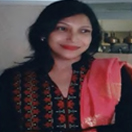
Associate Professor
View Profile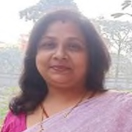
Assistant Professor
View Profile
Monastic Faculty
View Profile| ACADEMIC CALENDAR | Download |
|---|---|
| ACADEMIC CALENDAR July – December 2024 | Click Here |
| ACADEMIC CALENDAR 2023-2024 | Click Here |
| ACADEMIC CALENDAR 2022-2023 | Click Here |
| ACADEMIC CALENDAR 2021-2022 | Click Here |
| ACADEMIC CALENDAR 2020-2021 | Click Here |
| ACADEMIC CALENDAR 2019-2020 | Click Here |
| ACADEMIC CALENDAR 2018-2019 | Click Here |
| Routine | Download |
|---|---|
| NEP 1 SEM 2024 | Click Here |
| ODD SEM 2022 | Click Here |
| EVEN SEM 2022 | Click Here |
| OCT 21 – JULY 22 | Click Here |
| EVEN SEM 2021 | Click Here |
| ODD SEM 2021 | Click Here |
| EVEN SEM 2020 | Click Here |
| ODD SEM JULY-DEC 2020-21 | Click Here |
| JULY – DEC 2019 | Click Here |
| Lesson Plan | Download |
|---|---|
| PART-1 AND PART-2 SYLLABUS UNITIZATION | Click Here |
| LESSON PLAN SEM-3 NEP | Click Here |
| PART-III SYLLABUS | Click Here |
| LESSON PLAN SEM-1 FINAL | Click Here |
| LESSON PLAN SEM-2 FINAL | Click Here |
| LESSON PLAN SEM-3 FINAL | Click Here |
| LESSON PLAN SEM-4 FINAL | Click Here |
| LESSON PLAN SEM-5 FINAL | Click Here |
| LESSON PLAN SEMESTER-5 DSC FINAL | Click Here |
| LESSON PLAN SEM-6 | Click Here |
| LESSON PLAN SEM-6 DSC FINAL | Click Here |
| LESSON PLAN NEP-2023 | Click Here |
| LESSON PLAN SEM-2 NEP | Click Here |
| Study Materials | Download |
|---|---|
| 6 schools of Indian Poetics | Click Here |
| Ashvaghosha project | Click Here |
| Asoka’s Giranara Rock Edict-1 | Click Here |
| Asoka’s Saranatha Pillar Edict | Click Here |
| Bana project | Click Here |
| Bharata viveka | Click Here |
| Bhashar-Itibritta | Click Here |
| BU 4.5.1-15 | Click Here |
| CC4 GITA SECTION A | Click Here |
| Chatterjee datta_Introduction To Indian Philosophy | Click Here |
| Chipitaka Charvanam | Click Here |
| Dandin project | Click Here |
| Eran Pillar Inscription of Samudragupta | Click Here |
| Gita project | Click Here |
| Kalidasa Kumarasambhavam | Click Here |
| KIRATARJUNIAM | Click Here |
| Mundaka Upanishad | Click Here |
| Saptapadarthi | Click Here |
| Vyakarana Siddhanta Kaumudi Samas Prakaran | Click Here |
| পুরাণ | Click Here |
| মহাভারত | Click Here |
| রামায়ণ | Click Here |
| Sahitya Darpana | Click Here |
| Kavyalankara Sutra Vritti | Click Here |
Continuous Evaluations
The Department of Sanskrit has instituted a comprehensive system of continuous assessment for its students, comprising class work, class tests, and periodic examinations throughout the academic year. Demonstrating an unwavering commitment to nurturing the holistic development of its students, the department endeavors to cater to the diverse learning needs of both adept and struggling learners alike. To facilitate this, instructors diligently administer regular class tests, mock examinations, and internal assessments at frequent intervals. Notably, the department orchestrates strategic test sessions immediately preceding the final year examinations, affording students ample opportunity to adequately prepare themselves for the culminating academic assessments.
Sample question papers are given below.
| Continuous Evaluations | Download |
|---|---|
| IA Sem 1 | Click Here |
| IA CC5 2022 | Click Here |
| IA CC12 | Click Here |
| IA Sem5 DSE1 | Click Here |
| IA GE3 | Click Here |
| Mock Test, CC5 and CC6, 2024 | Click Here |
| Mock Sem5 2022 CC11&CC12 | Click Here |
| Mock Test, CC11 and CC12, 2024 | Click Here |
| Mock Test, GE 5, 2024 | Click Here |
Department of Sanskrit
Extension Lectures/ Interdisciplinary Seminars/ Webinars/ Workshops
2018-2019
| SL. NO. | DATE | EVENT | RESOURCE PERSON | TITLE |
| 1 | 19.7.2018 | Extension Lecture | Dr. Tamonash Chakraborty
Assistant Professor, Barasat Govt. College |
Karaka-vibhakti
|
| 2 | 22.09.2018 | Extension Lecture | Dr. Sarbani Bhattacharya
Associate Professor, APC College, New Barrackpore |
Kalidas o Bhasa-tulanamulak alochana |
| 3. | 18.11.2018 | Extension Lecture | Prof. Didhiti Biswas
Ex-Professor, Dept. of Sanskrit, University of Calcutta |
Women Empowerment in the Vedic age |
| 4 | 19.3.2019 | Extension Lecture | Suparna Sengupta
Assistant Professor, Hooghly Mohosin College |
Grammar-Case Endings
|
2019-2020
| SL. NO. | DATE | EVENT | RESOURCE PERSON | TITLE |
| 1 | 20.8.2019 | Extension Lecture | Dr. Tamonash Chakraborty
Assistant Professor, Barasat Govt. College |
Tarkasamgraha |
| 2 | 11.09.2019 | Extension Lecture | Prof. Ratna Basu
Ex-Professor, Dept.of Sanskrit, University of Calcutta |
Figures of speech according to Sahityadarpana (Chapter X) |
| 3 | 13.12.19 | Extension Lecture | Mr Vishwarupa Mondol
Assistant Professor, Tarakeshwar College |
Indian Philosophy |
| 4 | 15.06.2020
ONLINE |
Extension Lecture | Dr. Sarbani Bhattacharya
Associate Professor, APC College, New Barrackpore |
Prose Romance and Some Modern Sanskrit authors
|
2020-2021
| SL. NO. | DATE | EVENT | RESOURCE PERSON | TITLE |
| 1 | 03.07.2020
ONLINE |
Extension Lecture | Ruby Seth
Teacher, Prabartak Nari Mandir, Chandannagar |
Sanskrit Studies and Vidyasagar |
| 2 | 11.09.2020
ONLINE |
Webinar | 1.Prof. Didhiti Biswas
Ex-Professor, Dept.of Sanskrit, University of Calcutta 2.Dr. Nilanjana Dutta Sikdar Associate Professor, Dept of Sanskrit, Dumdum Motijheel College |
Shataborshe E Yuger Gargi Sukumari Bhattacharya |
| 3 | 29.11.2020
ONLINE |
Extension Lecture | Suparna Sengupta,
Assistant Professor, Sister Nivedita Govt General Degree College for Girls |
Delhi Topra Edict of Bisaladeva |
| 4 | 24.01.2021
ONLINE |
Extension Lecture | Prof. Ratna Basu
Ex-Professor, Dept.of Sanskrit, University of Calcutta
|
Eloquence and social consciousness of women as depicted in the Sanskrit creative literature |
| 5 | 26.06.2021
ONLINE |
Extension Lecture | Dr. Rimi Ghosh Dastidar
Assistant Professor, Dept of Bengali, P. R. Thakur Govt. College |
Computational Linguistics |
2021-2022
| SL. NO. | DATE | EVENT | RESOURCE PERSON | TITLE |
| 1 | 05.07.2021
ONLINE |
Extension Lecture | Prof. Sarbani Banerjee
Professor, Dept. of Philosophy, Rabindra Bharati University |
Ramakrishna- Vivekananda Darshan
|
| 2 | 9.7.21 &10.7.21
ONLINE |
Inter-disciplinary Seminar | Pravrajika Ishtatmaprana, HOD, Department of Philosophy, RKSMVV | Western Logic |
| 3 | 11.03.22
12.03.22 24.03.22 25.03.22 ONLINE |
Extension Lecture Series | Prof. Ratna Basu
Ex-Professor, Dept. of Sanskrit, University of Calcutta |
Computational Linguistics |
| 4 | 07.05.2022
08.05.2022 ONLINE |
Extension Lecture Series | Prof. Didhiti Biswas
Ex-Professor, Dept.of Sanskrit, University of Calcutta |
Bangadeshe Vedacharcha |
2022-2023
| SL. NO. | DATE | EVENT | RESOURCE PERSON | TITLE |
| 1 | 06.08. 2022
09.08.2022 ONLINE |
Extension Lecture | Dr. Loknath Chakraborty, Associate Professor of Sanskrit, Sanskrit College | Gaudiya Vaishnava Darshan and Shakta Darshan
|
| 2 | 01.12.2022
|
Inter-disciplinary Workshop | 1. Prof. Moushumi Guha, Department of Philosophy, Jadavpur University
2. Prof. Debasree Banerjee , Dept. of Education, University of Calcutta 3.Prof. Ratna Basu, Dept. of Sanskrit , University of Calcutta |
Research Methodology |
| 3 | 13.12.2022 | National Seminar | 1.Braja Kishore Swain,
Former Head & Prof, Deptof Dharmasastra, Shree Jagannath Sanskrit University, Puri, Odisha 2. Prof. Aditi Sarkar, Former Head & Professor, Dept. of Sanskrit, Burdwan University
3.Prof. Ayan Bhattacharya, Former HOD & Prof, Dept. of Sanskrit, West Bengal State University |
Desh-Kal-Samajer prekhite Rama Chowdhury-Srijib Nyaytirtha-Ambikaduttavyas er Sahityakirti |
2023-2024
| SL. NO. | DATE | EVENT | RESOURCE PERSON | TITLE |
| 1 | 19.07.2023 | Extension Lecture | Dr. Rohini Dharmapal,
Assistant Professor, RKSMVV
|
Psychological Analysis of Srimad Bhagavad Gita
and its relation with Rabindra music
|
| 2 | 27.07.2023 | Extension Lecture | Dr. Sutapa Roy, Associate Professor of Sanskrit, Lady Brabourne College | Prose Romance: Dandi and his literary work |
| 3 | 21.02.2024
|
Inter-disciplinary Workshop on Bengali Spelling | 1. Isha Dev Pal, HOD, Dept of Bengali, Sreerampur College
2.Vivek Karmakar, Assistant Professor, Dept of Sanskrit, Scottish Church College |
Bengali Spellings: Grammatical Rules |
| 4 | 27.03.2024 | Extension Lecture | Sm. Poulomi Saha, Assistant Professor, Dept of Sanskrit, Barasat Govt. College
|
Kavyalankara-sutra-vritti |
| 5. | 19.04.2024 | Extension Lecture | Dr. Dipankar Patra, Associate Professor, Dept of Sanskrit, APC College
|
Indian Epigraphy and Chronology |
| 6. | 24.05.2024 | Inter disciplinary seminar | 1.Sudakshina Ghosh, Associate Professor, Dept. of Bengali, Kishore Bharati Bhagini Nivedita College
2.Dr. Antara Banerjee, Associate Professor, Dept.of Sanskrit, Barasat Govt. College
|
Protibad o Protirodhe Nari: Sekal o Ekaler Kolome |
Educational Trips/ Literary Fest/ Meets & Fairs / Theatre Visits
2018 -2019
| SL. NO. | DATE | PLACE/ PLACES VISITED/ ACTIVITY | OBJECTIVE |
| 1 | 28.8.2018 | Observance of World Sanskrit Day | Our department organized a short cultural programme in Sanskrit and published our departmental journal Charaiveti to promote and celebrate the ancient language Sanskrit |
| 2 | 11.01.2019 | Jagadishchandra Bose Botanical Garden, Shivpur | To learn about Conservation of Eco system and plant species. It helped the student in understanding Environmental Ethics |
2019 -2020
| SL. NO. | DATE | PLACE/ PLACES VISITED/ ACTIVITY | OBJECTIVE |
| 1 | 20.8.2019 | Observance of World Sanskrit Day | Our department organized a short cultural programme in Sanskrit and published our departmental journal Charaiveti to promote and celebrate the ancient language Sanskrit. |
| 2 | 21.09.2019 | Ramakrishna Mission Institute of Culture, Golpark | A Sanskrita Charcha Cakram was organized at Golpark and two teachers of our department along with ten students of 3rd year went there to listen to the lectures on Grammar and Technical Sanskrit Literature as it is included in the syllabus of Part-3 of West Bengal State University. |
| 3 | 15.01.2020 | Eco Park, Kolkata | Visiting the seven wonders of the world is a dream for many but only a few are able to live through that dream. The Eco Park of Kolkata houses its own mini creations of the seven wonders of the world. Students got an idea of the Seven Wonders of the World by the replicas. |
| 4 | 15.02.2020 | Howrah Sanskrita Sahitya Samaj
Prinsep Ghat |
Howrah Sanskrit Sahitya Samaj organized a seminar on Epigraphy Studies where eminent scholar Prof Debarchana Sarkar of Jadavpur University and her student Dr. Sulagna Pradhan, Assistant Professor, Victoria College delivered an informative and extensive lecture on Epigraphy. As Epigraphy has been introduced in CC-8 of West Bengal State University so two teachers of our department along with all the students of Sem-4 went there to listen to the lectures. They became enlightened about Epigraphy.
Students visited Prinsep Ghat as it is a famous ghat in Calcutta. |
2020 -2021
| SL. NO. | DATE | PLACE/ PLACES VISITED/ ACTIVITY | OBJECTIVE |
| 1 | 03.08.2020 | Observance of World Sanskrit Day
https://youtu.be/pc3a-5mcmiw?si=KKP-OnfOi8vAl8Mh |
Our department released departmental journal Charaiveti online and video of cultural programmes in Sanskrit to promote and celebrate the ancient language Sanskrit.
|
| No Educational tour due to Covid | |||
2021 -2022
| SL. NO. | DATE | PLACE/ PLACES VISITED/ ACTIVITY | OBJECTIVE |
| 1 | 22.08.2021 | Observance of World Sanskrit Day | Our department released departmental journal Charaiveti online and video of cultural programmes in Sanskrit to promote and celebrate the ancient language Sanskrit. |
| No Educational tour due to Covid | |||
2022 -2023
| SL. NO. | DATE | PLACE/ PLACES VISITED/ ACTIVITY | OBJECTIVE |
| 1
|
26.09.2022 | Observance of World Sanskrit Day
|
Our department organized a short cultural programme in Sanskrit and published our departmental journal Charaiveti to promote and celebrate the ancient language Sanskrit. |
| 2 | 23.12.22 | Farm House Madhyamgram, Badu | To enjoy the natural beauty of the surroundings and to spend a live long day amidst nature |
2023 -2024
| SL. NO. | DATE | PLACE/ PLACES VISITED/ ACTIVITY | OBJECTIVE |
| 1
|
30.08.2023 | Observance of World Sanskrit Day
|
Our department organized a short cultural programme in Sanskrit and published our departmental journal Charaiveti to promote and celebrate the ancient language Sanskrit. |
| 2 | 19.12.2023 | Farm House at Barasat | To enjoy the natural beauty of the surroundings and to spend a live long day amidst nature |
EVENT REPORT
1. Name: “Prose Romance: Dandi and his literary work”.Category: Extension Lecture
Organising unit: Department of Sanskrit,RKSMVV
Date: 27.7.2023
Time: 11.45am
Number of Students: 22
Number of Resource Person: One
Name of Resource Person:
Dr. Sutapa Roy
Associate Professor
Lady Brabourne College
Number of Beneficiaries: All Students of Semester 1(Hons and General)
Brief description of the event:
Department of Sanskrit has arranged an extension lecture on the topic of “Prose Romance: Dandi and his literary work”.
Dr. Sutapa Roy has delivered a relevant and informative speech on Dandi and his poetical excellence.
PROGRAMME OUTCOME:
Students of 1st year honours and general have enriched their conceptions with the knowledge of ancient prose literature and especially the style and art of Dandi, reflected in ‘Dashakumarcharitam’.
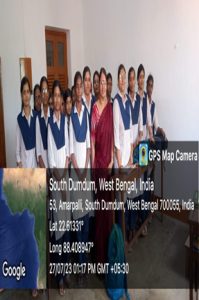
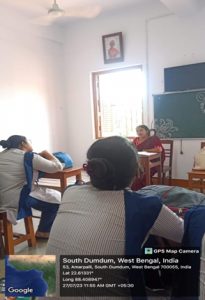
2. NAME -Extension LectureCategory: Extension Lecture
Organising Unit :Department of Sanskrit
Date-19th July,2023
Time-1.45pm
Number of students -30
Number of Resource Person-1
Name of Resource Person- Dr. Rohini Dharmapal Assistant Professor, Department of Education
Number of beneficiaries -33
Brief Description of the event – Dr Rohini Dharmapal had delivered a lecture on Gita and its Psychological analysis and its relation with Rabindramusic. Students enjoyed her lecture.
Programme Outcome-Understanding the ageless guiding principles of the Bhagavad Gita can help our students to gain a deep insight into the how’s and why’s of everyday life.
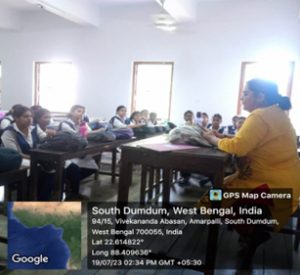

3. Name: Extension Lecture (Online)Category: Extension Lecture
Organising Unit: Department of Sanskrit of RKSMVV
Date :05.07.2021
Time:11.15pm
Number of Students:13
Number of Resource Person:1
Name of Resource Person: Prof. Sarbani Banerjee, Department of Philosophy, Rabindra Bharati University.
Number of Beneficiaris:All 6th Semester Students.
Brief Description of the Event: The department of Sanskrit has arranged an extension lecture on the topic Ramakrishna Vivekananda Darshan. Prof. Sarbani Banerjee has delivered a relevant speech on Ramakrishna Vivekananda Darshan.
Programme Outcome: The lecture was excellent and every student enjoyed it. This lecture helped them to understand the Philosophy of Ramakrishna- Vivekananda properly.
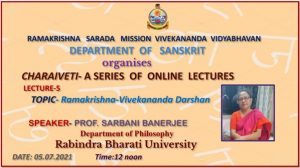
4. Name: Extension Lecture (Online)Category: Extension Lecture
Organising Unit: Department of Sanskrit of RKSMVV
Date: 26.06.2021
Time: 12.15pm
Number of Students:13
Number of Resource Person:1
Name of Resource Person: Dr.Rimi Ghosh Dastidar, Assistant Professor, Department of Bengali, P.R.Thakur Govt. College.
Number of Beneficiaries: 35(All 6th semester Students of RKSMVV and APC College)
Brief Description of the Event: The department of Sanskrit has arranged an extension lecture on the topic of ‘Computational Linguistics ‘.Dr.Rimi Ghosh Dastidar has delivered a wonderful lecture on this topic and she also discussed the question answer that asked by our students.
Programme Outcome:
Computational linguistics is the application of computer science to the analysis and comprehension to written and spoken language . This topic is very important to discuss with our students.The lecture was excellent .Every student enjoyed it .At the end of the session She took a question answer session and this was very helpful to clear all doubts of our students.
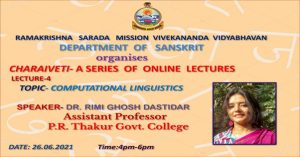
5. Name: Seminar (Online)Category: Seminar
Organising Unit: Department of Sanskrit of RKSMVV in collaboration with Gender Resource Centre,RKSMVV
Date: 24.01.2021
Time:11.15
Number of Students:30
Number of Resource Person: 1
Name of Resource Person:Prof . Ratna Basu ,Ex-Professor , Department of Sanskrit, University of Calcutta.
Number of Beneficiaries:65
Brief Description of the Event: Department of Sanskrit has arranged an extension lecture on the topic ‘Eloquence and Social Consciousness of Women as Depicted in the Sanskrit Creative Literature ‘. Professor Ratna Basu has delivered an informative speech on eloquence and social consciousness of women as Depicted in Sanskrit creative literature.
Programme Outcome : How Eloquence and Social Consciousness of Women as Depicted in the Sanskrit Creative Literature beautifully explained by Professor Ratna Basu . Students enrich their knowledge with the lecture and their interest increased to know Sanskrit Creative Literature.



6. Name: Extension lecture (Online)Category: Extension Lecture
Organising Unit: Department of Sanskrit of RKSMVV
Date:15.06.2020
Time:1.45pm
Number of Students:20
Number of Resource Person:1
Name of Resource Person: Dr. Sarbani Bhattacharya, Associate Professor,APC College,New Barrackpore.
Number of Beneficiaries:20
Brief Description of the Event: The department of Sanskrit has arranged an extension lecture on the topic ‘Prose Romance and Some Modern Sanskrit Authors’.Dr.Sarbani Bhattacharya has delivered relevant and informative speech on prose romance and some modern Sanskrit authors .
Programme Outcome:This lecture helped students to know the Sanskrit author from different parts of India. Dr.Sarbani Bhattacharya discussed all about prose romance and explained with examples.

7. Name: Extension Lecture (Online)Category: Extension Lecture
Organising Unit: Department of Sanskrit of RKSMVV
Date: 29.11.2020
Time: 11.15pm
Number of Students:15
Number of Resource Person: 1
Name of Resource Person:Suparna Sengupta,Assistant professor, Sister Nibedita Govt.Degree College for girls.
Number of Beneficiaries: 15
Brief Description of the Event: Department of Sanskrit has arranged an extension lecture on the topic ‘Delhi Topra Edict of Bisaladeva’. Professor Suparna Sengupta has delivered an informative speech on this topic.
Programme Outcome: This lecture helps to know our ancient epigraphical history and it motivates our students to read Epigraphy.

8. Name: Extension Lecture (Online)Category: Extension Lecture
Organising Unit: Department of Sanskrit of RKSMVV
Date: 03.07.2020
Time:11.15pm
Number of Students:
Number of Resource Person:1
Name of Resource Person: Ruby Seth, Teacher,Prabartak Nari Mandir, Chandannagar.
Number of Beneficiaries:
Brief Description of the Event: Department of Sanskrit has arranged an extension lecture on the topic ‘Sanskrit Studies and Vidyasagar ‘. Teacher Ruby Seth has delivered a wonderful speech on this topic.
Programme Outcome: Vidyasagar made significant contributions to various fields, including education, women’s rights, and Sanskrit Studies . Vidyasagar’s contribution for Sanskrit studies in British India and its impact on society Cleared in the class.Our students get inspiration in this class for learning Sanskrit.

9. Name: Extension LectureCategory: Extension Lecture
Organising Unit: Department of Sanskrit of RKSMVV
Date: 20.08.2019
Time:12.15pm
Number of Students: 16
Number of Resource Person:1
Name of Resource Person: Dr.Tamonash Chakroborty, Assistant Professor, Barasat Govt. College.
Number of Beneficiaris: All the Students of 3rd year and some other students.
Brief Description of the Event: The department of Sanskrit has arranged an extension lecture on the topic ‘Tarkasamgraha’. Dr. Tamonash Chakraborty has delivered a wonderful speech on Tarkasamgraha .
Programme Outcome: All the 3rd year students enrich their philosophical thought with the lecture of Tamonash Chakraborty on Tarkasamgraha. And after the session they get a clear knowledge on Tarkasamgraha.and the students enjoyed the lecture.
10. Name: Extension LectureCategory: Extension Lecture
Organising Unit: Department of Sanskrit of RKSMVV
Date:19.03.2019
Time:12.15pm
Number of Students:25
Number of Resource Person:1
Name of Resource Person: Suparna Sengupta, Assistant Professor, Hooghly Mohosin College.
Number of Beneficiaris:All the 1st year students (Hons+Gen.) And Some other students of our department.
Brief Description of the Event: The department of Sanskrit has arranged an extension lecture on the topic ‘Grammer and Case ending ‘.Suparna Sengupta has delivered a speech on Sanskrit Grammar and Case ending and She shows in the class how to do case ending.
Programme Outcome: All the Students who are joined the class benefited greatly. Some Students has fear about Sanskrit Grammar but after joined this lecture the fear was gone.
11. Name: Extension LectureCategory: Extension Lecture
Organising Unit: Department of Sanskrit of RKSMVV
Date: 20.08.2019
Time:12.15pm
Number of Students: 16
Number of Resource Person:1
Name of Resource Person: Dr.Tamonash Chakroborty, Assistant Professor, Barasat Govt. College.
Number of Beneficiaris: All the Students of 3rd year and some other students.
Brief Description of the Event: The department of Sanskrit has arranged an extension lecture on the topic ‘Tarkasamgraha’. Dr. Tamonash Chakraborty has delivered a wonderful speech on Tarkasamgraha .
Programme Outcome: All the 3rd year students enrich their philosophical thought with the lecture of Tamonash Chakraborty on Tarkasamgraha. And after the session they get a clear knowledge on Tarkasamgraha.and the students enjoyed the lecture.
12. Name: Extension lectureCategory: Extension lecture
Organizing Unit : Department of Sanskrit of RKSMVV
Date: 17.2.2018
Time : 12.5pm
Number of Students: 20
Number of Resource Person – 1
Name of Resource Person – Dr. Pradip Chandra Das , Assistant Professor ,Rabindra Bharati University
Number of Beneficiaris : All students of Semester 3(Hons+Gen).
Brief Description of the Event: Department of Sanskrit has arranged an extension lecture on the topic of ‘Vishrutacaritam ‘. Dr. Pradip Chandra Das deleverd an informative speech on Vishrutacaritam.He discussed the writer of Vishrutacaritam, the story and how write question answer etc.
Programme Outcome: All the students benefited a lot . Their interest increased to read Vishrutacaritam and they learned a lot about the writer Dandi.
13. Name: Extension LectureCategory: Extension Lecture
Organizing Unit: Department of Sanskrit of RKSMVV
Date: 19.07.2018
Time: 11.15pm
Number of Students: 23
Number of Resource Person: 1
Name of Resource Person: Dr. Tamonash Chakraborty, Assistant Professor, Barasat Govt. College.
Number of Beneficiaris: All the 3rd Year Students of Sanskrit department.
Brief Description of the Event: Our Sanskrit department has arranged an extension lecture on the topic Karak bivakti’. Dr. Tamonash chakroborty has discussed how much important Karak bivakti in Sanskrit Grammar and he discussed all case endings. It was a beautiful session.
Programme Outcome : First of all their fear was gone about case endings(karak bivakti) in Sanskrit Grammar. All the Students enjoyed the session. They also learned how to give answer about case ending in examination.
14. Name: Extension LectureCategory: Extension Lecture
Organizing Unit: Department of Sanskrit of RKSMVV
Date: 22.09.2018
Time: 12.15pm
Number of Students: 20
Number of Resource Person:1
Name of Resource Person: Dr. Sarbani Bhattacharya, Associate Professor, Apc College,New Barakpur.
Number of Beneficiaris:All 2nd year students of our department.
Brief Description of the Event: Our Sanskrit department has arranged an extension lecture on the topic ‘ A Comparative Discussion on the Mahakabi Kalidas and Vasa ‘. Dr.Sarbani Bhattacharya delivered a speech on The comparative discussion on Mahakavi Kalidas and Vasa. And She beautifully described their influence on Sanskrit literature.
Programme Outcome: Our Students interest increased to know the Sanskrit poet They got a lot of new information about Mahakavi Kalidas and Vasa.
15. Name: Extension LectureCategory: Extension Lecture
Organising Unit: Department of Sanskrit of RKSMVV
Date :18.11.2018
Time: 11.15 pm
Number of Students: 22
Number of Resource Person: 1
Name of Resource Person: Prof.(Dr.)Didhiti Biswas, Ex Professor, Department of Sanskrit, University of Calcutta.
Number of Beneficiaris: All students of 3rd Year and Some interested Students of our department.
Brief Description of the Event:The department of Sanskrit has arranged a extension lecture on the topic ‘Women Empowerment at Vedic Age ‘.Prof.Didhiti Biswas has delivered a relivent and informative speech on Women empowerment at Vedic Age.
Programme Outcome: Students enrich their conception with the knowledge of Women empowerment at Vedic Age. Students get a lot of new information. They also motivated and enjoyed the session.
16. Name: Extension LectureCategory: Extension Lecture
Organizing Unit: Department of Sanskrit of RKSMVV
Date: 13.12.2019
Time: 12.15pm
Number of Students: 15
Number of Resource Person: 1
Name of Resource Person: Mr. Biswarup Mandol, Assistant Professor, Tarakeswar College.
Number of Beneficiaries: All the 3rd Year Students of our department.
Brief Description of the Event: Our Sanskrit department has arranged an extension lecture on the topic ‘Indian Philosophy’. Mr. Biswarup Mondol has delivered an informative lecture on Indian philosophy.
Programme Outcome : The lecture on Indian philosophy is very important for our 3rd year students because it is included in their syllabus. It is also helpful to others who are interested in Indian philosophy. This lecture motivated some students who wanted to read philosophy in their higher studies. At the End question answer session was very helpful for our students.


17. Name: INTER -COLLEGE WEB TALK SERIES (Online)Category: Extension Lecture
Organising Unit:The department of Sanskrit of RKSMVV and APC College.
Date: 06.008.2021 &07.08.2021
Time :11.15pm
Number of Students:35
Number of Resource Person:1
Name of Resource Person: Dr.Loknath Chakraborty , Associate Professor, Department of Sanskrit, Of Sanskrit College.
Number of Beneficiaries: 40
Brief Description of the Event: The department of Sanskrit of RKSMVV and APC College has jointly organized an extension lecture on the topic ‘ Bangiyadarshanchinta’.
The most eminent speaker Dr. Loknath Chakraborty has delivered two special lecture on Gaudiya Vaishnava Darshan and Shaktadarshan .
Programme Outcome: All the Students enrich their conception with the knowledge of Gaudiya Vaishnava Darshan and Shaktadarshan .Dr.Loknath Chakroborty also discussed questions & answers for the students.


18. Name: Lecture Series (Online)Category: Extension Lecture
Organising Unit: The department of Sanskrit of RKSMVV in Collaboration with howrah Sanakrita Sahitya Samaj.
Date:11.03.2022,12.03.2022, 13.03.2022,& 14 .03.2022
Time :12.15pm
Number of Students: 60
Number of Resource Person:1
Name of Resource Person: Professor Ratna Basu, Ex- Professor of the department of Sanskrit of University of Calcutta.
Number of Beneficiaries: 60
Brief Description of the Event: The department of Sanskrit of RKSMVV and Howrah Sanskrita Sahitya Samaj jointly organized a lecturer series on the topic ‘Computational Linguistics ‘. Professor Ratna Basu has delivered lectures on this topic in this lecture series.
Programme Outcome:Computational linguistics is the application of computer science to the analysis and comprehension to written and spoken language . Professor Ratna Basu took her classes in an analytical and practical way . The lecture was excellent .Every student enjoyed it .At the end of the session She took a question answer session and this was very helpful to clear all doubts of our students.

YOU TUBE LINK: https://youtu.be/tX9Vfd4TZMI
19. Name :Inter departmental Web talk(online)Category: Extension Lecture
Organising Unit: Department of Sanskrit.
Date: 09.07 2021 & 10.07 2021
Time :11.15pm
Number of Students:25
Number of Resource Person:1
Name of Resource Person: Pravrajika Ishtatmaprana ,HOD, Department of Philosophy of RKSMVV .
Number of Beneficiaries: All the Students of Sem-6 of the Department of Sanskrit and all the students of sem-2 of the Department of Philosophy.
Brief Description of the Event: The department of Sanskrit has arranged a web talk series on the topic of Indian logic and Western logic. Pravrajika Ishtatmaprana has delivered her valuable lecture on this topic.
Programme Outcome: How one can solve Indian and Western logic and its analytical thing was cleared in her lecture .Every student enjoyed the lectures.
20. Name: WEB TALK SERIES (Online)Category: Extension Lecture
Organising Unit: The department of Sanskrit of RKSMVV and APC College.
Date: 07.05.2022& 08.05.2022.
Time :11.15 am
Number of Students: 30
Number of Resource Person:1
Name of Resource Person: Professor Didhiti Biswas,Ex-professor of department of Sanskrit of University of Calcutta.
Number of Beneficiaries: 30
Brief Description of the Event:The department of Sanskrit of RKSMVV and APC College jointly organized two extension lecture on the topic ‘ Bangadeshe Vedacharca’. Professor Didhiti Biswas has delivered two special lectures on this topic.
Programme Outcome: The professor Didhiti Biswas has explained analytically with examples how Vedic practice was prevalent in Bengal.

YOU TUBE LINK: https://www.youtube.com/live/DhYtLDobK8s?feature=share
https://www.youtube.com/live/usdTClGToyE?feature=share
SEMINARS

21. Name: Shatabarshe e juger Gargi Sukumari BhattacharyaCategory: State Level Webinar
Organizing Unit: IQAC and Department of Sanskrit, Acharya Prafulla Chandra College and RKSMVV
Date: 11.09.2020
Time: 4.30 pm
Number of Students: 90
Number of Resource Person: 2
Name of Resource Person: Sukumari Bhattacharya.
Number of Beneficiaries: 96
Brief Description of the Event: Department of Sanskrit and IQAC of Acharya Prafulla Chandra College and RKSMVV has jointly organized a State Level Seminar on “Shatabarshe e yuger Gargi’ . Sukumari Bhattacharya” . The programme started at 4:30 pm with the Vedic Chanting by the students of RKSMVV followed by an informative and excellent welcome address by Dr. Chaiti Mitra, IQAC Coordinator, RKSMVV. Opening remarks and introduction of the programme was given by Dr. Sanghamitra Mukherjee, HOD, Dept.of Sanskrit, RKSMVV.. She emphasized the need of literary contributions of Sukumari Bhattacharya..
Next, it was Dr. Saktibrata Bhowmik, the Principal of APC College, who presented forth a speech in which he cordially welcomed and shared his gratitude to all the people present. He also emphasized on the importance of the seminar and hoped for this seminar to culminate into a successful and enriching one.Afterwards Dr. Didhiti Biswas and Dr. Nilanjana Sikdar elaborately discussed the literary creations of Sukumaridi. These speeches were followed by question, discussion and view points of the participants and speakers.
Programme Outcome : All the participants enjoyed the session. Sukumari Bhattacharya was a profound scholar and humanitarian who worked towards gender equality and freedom of expression for women during her lifetime. She had a tremendous command over so many languages beginning from her vernacular Bengali to Sanskrit, English, German, French, Pali and the list only gets longer. Her adherence to secularism, her engagement in almost all the avenues of language and her involvement in different branches of philosophical understanding made her one of the greatest luminaries of her time.

22. National Level SeminarName: Desh-Kal-Samaj er prekhite Rama Chowdhury-SriJib Nyaytirtha- Ambikaduttavyas er Sahityakirti
Category: State Level Seminar Organising unit:
Date 13.12.2022
Time10.30 am
Number of Students: 120 From RKSMVV: 40
From APC College: 80
Number of Teachers: 15 From RKSMVV: 3
From APC College: 4
Participant Teachers from various colleges:8 Resource Persons
Former Head & Professor, Department of DharmasastraShree Jagannath Sanskrit University, Puri, Odisha
Former Head & Professor, Department of Sanskrit University of Burdwan
Former HOD & Professor, Department of SanskritWest Bengal State University Number of beneficiaries: 120 students are the beneficiaries
Brief description of the event:
IQAC & Department of Sanskrit , Ramakrishna Sarada Mission Vivekananda Vidyabhavan in collaboration with IQAC & Department of Sanskrit , Acharya Prafulla Chandra College, New barrackpore had organized a one day State Level Seminar on Desh-Kal-Samaj er prekhite Rama Chowdhury-Srijib Nyaytirtha-Ambikaduttavyas er Sahityakirti on December 13, 2022. The seminar focused on the literary works of Rama Chowdhury, Srijib Nyaytirtha and Ambikaduttavyas. The programme started at 10:30 am with the Vedic Chanting by the students of RKSMVV followed by welcome address by Dr. Chaiti Mitra, IQAC Coordinator, RKSMVV. Opening remarks and introduction of the programme was given by Dr. Sanghamitra Mukherjee, HOD, Dept. of Sanskrit, RKSMVV.. She emphasized the need of literary contributions of modern Sanskrit Scholars.
Next, it was Dr. Saktibrata Bhowmik, the Principal of APC College, who presented forth a speech in which he cordially welcomed and shared his gratitude to all the people present. He also emphasized on the importance of the seminar and hoped for this seminar to culminate into a successful and enriching one.
The 1st Technical Session started at 11.15 am with the deliverance of a speech by the Resource Person Prof. Braja Kishore Swain on Chipitakcharvane Bastubhaivam. Our next honourable speaker Prof. Aditi Sarkar delivered a speech on the comparative study of Shivrajbijaya by Ambikaduttavyasa andMaharashtrajivanaprobhata by Rameshchandra Dutta.. Following Prof. Sarkar, the last and third speech was delivered by the eminent Speaker Prof. Ayan Bhattacharya on Alankarsastradrishtya Jugajivana natakasya samutkarshe tatroupasthapitadeshkalsamajasthite prabhaba.
These speeches were followed by question, discussion and view points of the participants and speakers. This session was concluded by Pravrajika Vedarupaprana, the Principal,RKSMVV.
In the post lunch sessions participants presented their paper in academic sessions. chaired by Dr. Sarbani Bhattacharya, Dept of Sanskrit, APC College.
Certificates were distributed to the participants at last. The programme was ended with vote of thanks by Dr. Sarbani Bhattacharya.
Outcome :





23. Name: One Day Interdisciplinary Workshop on Research Methodology
Category: Workshop
Organizing Unit: Jointly organized by Departments of Education,Philosophy,and Sanskrit of RKSMVV in Collaboration with IQAC, RKSM Vivekananda Vidyabhavan.
Date:01.12.2022
Time: 10.30am to 3.45pm
Number of Students:100
Number of Resource Person:3
Name of Resource Person:
Brief Description of the Event:The department of Sanskrit, Philosophy and Education jointly organized a Seminar on Research Methodology . Welcome address was given by Pravrajika Vedarupaprana and inaugural address given by Dr.Bidisha Chatterjee on behalf of IQAC.. Prof.Mousumi Guha delivered a relevant speech on Research – The first steps. Professor Deboshree Banerjee gave a lecture on Quantitative – Qualitative Method and Tools of Data Collection . Professor Ratna Basu has delivered a wonderful speech on Literature Review and Bibliography. There was also an interactive session and hands-on training .
Programme Outcome: The WorkShop is very important for every students specially who are interested in higher education in their subjects. The Seminar helped to clear all doubts and questions about Research Methodology. It practically helped students to understand all about Research Methodology. It was a wonderful informative motivative session of our students.

Category: Faculty Exchange

Date: 13.04.23
Time: 10.30 am onwards
Venue: RKSMVV
Name of Resource Persons: Uday Shankar Khatua, Ass Prof, Dept of Sanskrit, Nayagram PRM Govt College
Number of Participants: 25
Programme Outcome: Students enjoyed the talk on ‘Paniniyan Systems of Sanskrit Grammar’.
*** *** ***
25. Name of Activity: Faculty Exchange (Department of Sanskrit)
Category: Class Lecture
Topic: Śabdaśakti
Date: 12th June, 2023
Time: 12 noon to 01:00 pm
Venue: Room no-34, Ramakrishna Sarada Mission Vivekananda Vidyabhavan
Name of Resource Person:
Poulomi Saha, Assistant Professor, Department of Sanskrit, Barasat Government College
Number of Participants: 15 students
Programme Outcome: The students were happy as they could get a comprehensive idea about the topic.


*** *** ***
26. Name of Activity: Faculty Exchange (Department of Sanskrit)
Category: Class Lecture
Topic: General Idea of Sanskrit Poetics
Date: 12th June, 2023
Time: 1.30 pm to 2.30 pm
Venue: Room no-34, Ramakrishna Sarada Mission Vivekananda Vidyabhavan
Name of Resource Person:
Poulomi Saha, Assistant Professor, Department of Sanskrit, Barasat Government. College
Number of Participants: 15 students
Programme Outcome:
The students were happy as they could get a comprehensive idea about the topic.
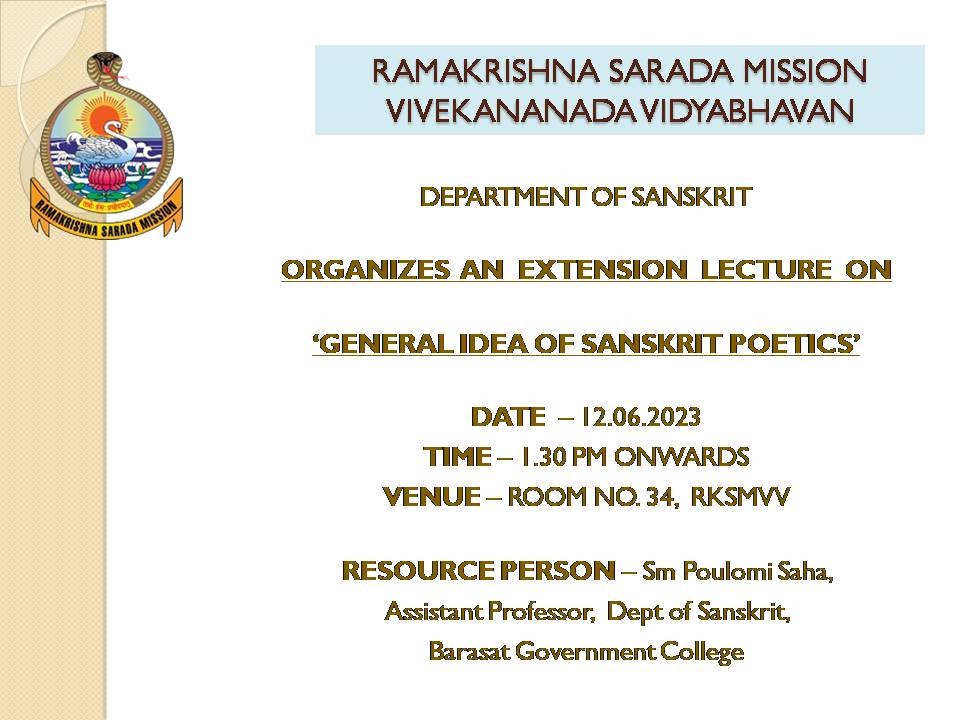
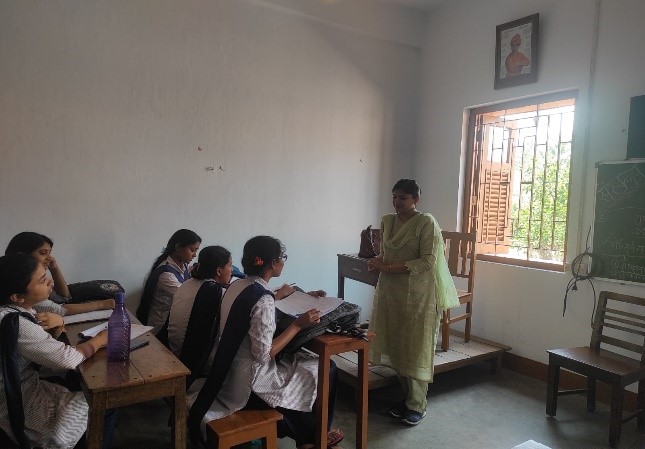
*** *** ***
27. Name of the Activity: Extension Lecture
Organising Unit: Department of Sanskrit, RKSMVV
Date: 15 March and 12 April 2023
Time: 12.30pm
Venue: Room No. 24
Name of the Resource Person: Dr. Dipankar Patra, Associate Professor, Dept of Sanskrit, APC College
Name of the participants: Students of Semester 4
Brief description of the event:
Dr. Dipankar Patra delivered a resourceful lecture on the Indian Epigraphy, Paleography and Chronology with vivid description and example of various Inscriptions.
Programme Outcome: Students were benefited with his various inputs about Indian epigraphy.

*** *** ***
28. Name of the Activity: International Mother Language Day
Organising Unit: Departments of Sanskrit and Bengali along with IQAC, RKSMVV
Date: 21.2.2024
Time: 1 – 3.30 pm
Venue: Swamiji Bhavan
Name of the Resource Person: Sm Isha Dev Pal (Associate Professor, Head of Department, Bengali, Srirampur College) and
Dr. Vivek Karmakar (Assistant Professor, Department of Sanskrit, Scottish Church College)
Number of participants: All students of RKSMVV
Brief description of the Event: Students and teachers of RKSMVV celebrated this auspicious day with the lectures by Dr. Isha Dev Pal. She explained how the Bengali language evolved through Bengali fables and fairy tales. Dr. Vivek Karmakar described vividly how to spell correctly words with Murdhanya na and Murdhanya Sha.
Programme Outcome: Participants were benefited to know the appropriate pronunciation of the words with grammatical explanations.

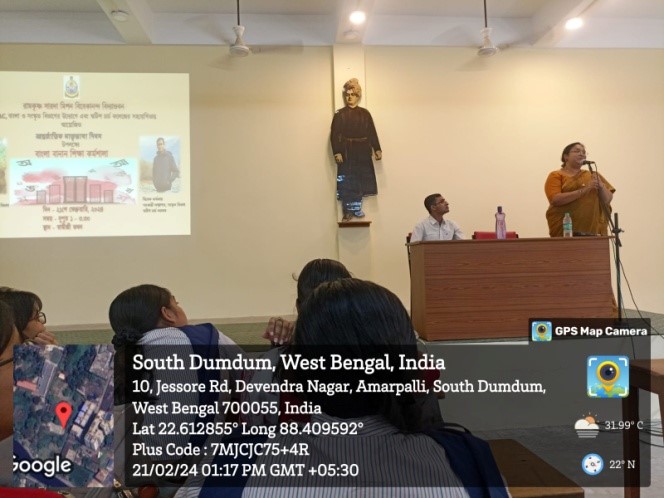
*** *** ***
29. Name of the Activity: Prativaad O Protirodhe Nari: Se-kaal O e-kaaler kolome
Category: Interdisciplinary Lecture
Organising Unit: Departments of Sanskrit and Bengali along with IQAC, RKSMVV.
Date: 24.5.2024
Time: 1pm
Venue: Room No.8
Name of the Resource Persons:
Dr. Sudakshina Ghosh, Associate Professor (Department of Bengali), Kishore Bharati Bhagini Nivedita College and
Dr. Antara Banerjee, Associate Professor (Department of Sanskrit), Barasat Govt College.
Number of the participants: All students of Bengali and Sanskrit Departments.
Brief description of the Event: Dr. Sudakshina Ghosh discussed some Middle-age and Modern Bengali literary works and explained that inspite of tremendous pressure and social suppression women could protest or revolt vocally or silently to establish their viewpoint.
Dr. Antara Banerjee described the struggle and revolt of women in the light of mythological anecdotes.
Programme Outcome: Students with ultramodern technological facilities came to know about the situations of suppressed women and their struggle to break the barricade. They learnt how to empower oneself and stand against the patriarchal domination.
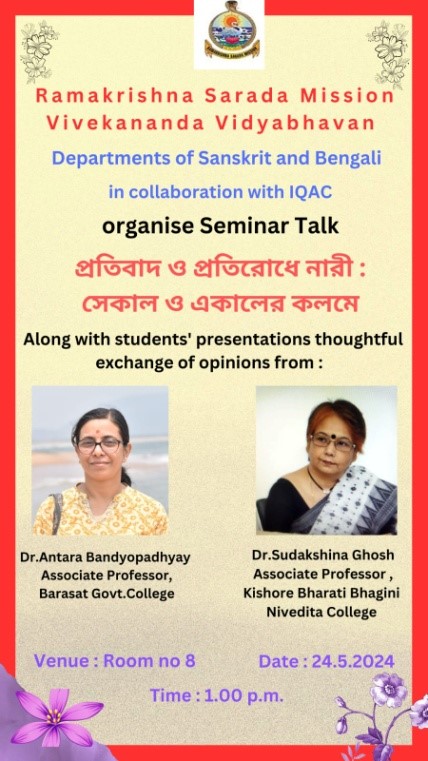

Departmental Policy for Slow and Advanced Learners on the basis of minutes of departmental meeting held on 14/07/2022
At first identification of slow and advanced learners was done from class through class-response/performance of respective students within one month from the commencement of their classes. Moreover regular assessments, teacher observations and input from parents or guardians also help to identify the slow learners.
SLOW LEARNERS
ADVANCE LEARNERS
Attendance registers are prepared for semesters I, II & V and semesters II, IV & VI respectively. Assessment is given in the form of write-ups on important topics, classroom discussions on relevant parts of the syllabus, collaborative projects and individual home assignments. Question papers are also preserved for reference.
UNIVERSITY RESULTS
| YEAR | APPEARED | PASSED | 1ST CLASS | COLLEGE TOPPER | UNIVERSITY RANKS |
| 2017 | 2 | 2 | 2 | Payel Sana
(63.63%) |
8th |
| 2018 | 15 | 15 | 4 | Nandita Das
(66.25%) Arpita Sarkar (62.88%) |
4th
10th |
| 2019 | 13 | 13 | 3 | Madhumita Ghosh (67.75%)
Anuradha Baidya (63%) |
4th
8th |
| 2020 | 11 | 11 | 6 | — | — |
| 2021 | 12 | 12 | 11 | Ananya Bhattacharya (79.35%) | 9th |
| 2022 | 12 | 12 | 12 | Suparna Dey (87.45%)
Ipswita Jaman (86.41%) Arpita Adhikary (82.95%) |
1st
2nd
6th |
| 2023 | 7 | 6 | 6 | Katha Karmakar (86.1%)
Priyanka Mondal (81.45%) |
2nd
7th |
Result of CBCS System
Department of Sanskrit
| Year | Appeared | Passed | CGPA 6-7
60%-70% |
CGPA 7-8
70%-80% |
CGPA 8-9
80%-90% |
CGPA 9- 10
Above 90% |
University
Ranks(1st to 10th) |
| 2024 | 5 | 5 | – | – | 2 | 3 | ND |
| 2023 | 7 | 6 | – | – | 3 | 3 | 2 students |
| 2022 | 12 | 12 | – | – | 2 | 10 | 3 students |
| 2021 | 12 | 12 | 1 | 3 | 5 | 3 | 1 student |
2024
| Results of CBCS System | ||||||
| Year
2024 (Sem VI) |
Appeared | Passed | CGPA
6-7 (60% -70%) |
CGPA
7 – 8 (70% – 80%)
|
CGPA
8 – 9 (80% – 90%) |
CGPA
10 Above 90% |
| Barbi
Sarkar |
P | 8.47 | ||||
| Jayashree
Mondal |
P | 9.33 | ||||
| Mita Roy | P | 8.83 | ||||
| Priya Mondal | P | 9.37 | ||||
| Riya Bain
|
P | 9.16 | ||||
2023
| Results of CBCS System | ||||||
| Year
2023 (Sem VI) |
Appeared | Passed | CGPA
6-7 (60% -70%) |
CGPA
7 – 8 (70% – 80%)
|
CGPA
8 – 9 (80% – 90%) |
CGPA
10 Above 90% |
| Katha Karmakar | P | 9.66 | ||||
| Sujata Lohar | P | 8 | ||||
| Priyanka Mondal | p |
9.43 |
||||
| Antara Roy | P | 8.54 | ||||
| Shyama Rani Das | P | 9.1 | ||||
| Piyali Ghosh | P | 8.50 | ||||
2022
| Results of CBCS System | ||||||
| Year
2022
(Sem VI) |
Appeared | Passed | CGPA
6-7 (60% -70%) |
CGPA
7 – 8 (70% – 80%)
|
CGPA
8 – 9 (80% – 90%) |
CGPA
10 Above 90% |
| Arpita Adhikari | P | 9.53 | ||||
| Chumki Mondal | P | 9.11 | ||||
| Disha Mistri | P | 8.81 | ||||
| Ipswita Jaman | P | 9.76 | ||||
| Johita Koyal | P | 9.24 | ||||
| Mamoni Pahari | P | 9.14 | ||||
| Minakshi Das | P | 9.36 | ||||
| Rakhi Ruidas
|
P | 9.09 | ||||
| Sayantika Ghosh
|
P | 9.20 | ||||
| Sikha Jana
|
P | 9.16 | ||||
| Sulata Das
|
P | 8.66 | ||||
| Suparna Dey | P | 9.83 | ||||
2021
| Results of CBCS System | ||||||
| Year
2021 (Sem VI |
Appeared | Passed | CGPA
6-7 (60% -70%) |
CGPA
7 – 8 (70% – 80%)
|
CGPA
8 – 9 (80% – 90%) |
CGPA
10 Above 90% |
| Dipika Mondal | P | 8.63 | ||||
| Dolon Sarader | P | 7.96 | ||||
| Purnima Karan | P | 8.29 | ||||
| Riya Biswas | P | 8.21 | ||||
| Aditi Nath | P | 6.51 | ||||
| Hrittrisha Ghosh | P | 8.04 | ||||
| Mampi Pramanik | P | 8.27 | ||||
| Mrinmoyee Bera | P | 9.10 | ||||
| Nandita Ghosh | P | 7.92 | ||||
| TanushreeSadhukhan | P | 9.13 | ||||
| Amiya Chattopadhyay | P | 7.60 | ||||
| Ananya Bhattacharjee | P | 9.29 | ||||
STUDENT PROGRESSION
2018-19
| 2018-19 | Madhumita Ghosh | Jadavpur University | M.A in Sanskrit |
| 2018-19 | Suchismita Ghosh | Sanskrit College and University | M.A in Sanskrit |
| 2018-19 | Chaina Gorai | Bankura University | M.A in Sanskrit |
| 2018-19 | Anupama Santra | Biswanath Institute of B.Ed College | B.ED |
| 2018-19 | Rumala Pradhan | The Sanskrit College and University | M.A in Sanskrit |
| 2018-19 | Rinku Dolui | Rabindrabharati university | M.A in Sanskrit |
| 2018-19 | Barnali Mondal | WBUTTEPA (BibhutibhusanB.ed college) | B.ED |
| 2018-19 | Priyanka Mukherjee | M Hossian teacher training Institute | D. El. Ed |
2019-20
| 2019-20 | Manisha Mandal | District Institute of Education and Traning, Murshidabad | D.El.Ed. |
| 2019-20 | Saswati Mondal | Rabindra Bharati University | M.A. In Sanskrit |
| 2019-20 | Krishna Mukherjee | Front page Academy | D.El.Ed. |
| 2019-20 | Debasree Roy | Diamond Harbour Women’s University | M.A. in Sanskrit |
| 2019-20 | Tanusri Debnath | Prashanta Dasgupta College of Education | B.Ed. |
| 2019-20 | Pubali Chowdhury | WEST BENGAL STATE UNIVERSITY | M.A. In Sanskrit |
| 2019-20 | Barnali Pandit | WEST BENGAL STATE UNIVERSITY | M.A. In Sanskrit |
| 2019-20 | Basanti Pal | WEST BENGAL STATE UNIVERSITY | M.A. In Sanskrit |
2020-21
| 2020-21 | Ananya Bhattacharjee | Sanskrit College | MA in Sanskrit |
| 2020-21 | Dipika Mondal | Haritha college of Nursing, Kakinada, Andhra Pradesh. | Nursing |
| 2020-21 | Hrittrisha Ghosh | Kamakhya Institute of Education | D.El.Ed |
| 2020-21 | MampiPramanik | Diamond Harbour Women’s University | MA in Sanskrit |
| 2020-21 | Mrinmoyee Bera | WBSU | MA in Sanskrit |
| 2020-21 | Nandita Ghosh | Royal Keven’s Academy, Dumdum. | Studying for Wellness Advisor |
| 2020-21 | Purnima Karan | Dist Institute of Education and Training | D.El.Ed |
| 2020-21 | Riya Biswas | WB University of Teachers’ Training, Education Planning and Administration | B.Ed. |
| 2020-21 | Dolon Sarader | Rabindra Bharati University | MA in Music |
| 2020-21 | Tanusree Sadhukhan | Diamond Harbour Women’s University | MA in Sanskrit |
| 2020-21 | Amiya Chatterjee | BhandarhatiIndranidevi Institute of B.Ed. | B.Ed |
2021-22
| 2021-22 | Suparna Dey | Sarojini Naidu College for Women. | M.A. in Sanskrit |
| 2021-22 | Arpita Adhikary | West Bengal State University | M.A. in Sanskrit |
| 2021-22 | Ipswita Jaman | Jadavpur University | M.A. in Sanskrit |
| 2021-22 | Rakhi Ruidas | Sanskrit College and University | M.A. in Sanskrit |
| 2021-22 | Disha
Mistry |
West Bengal State University | M.A. in Sanskrit |
| 2021-22 | Sikha
Jana |
Vidyasagar
University |
M.A. in Sanskrit |
| 2021-22 | Johita Kayal | West Bengal State University | M.A. in Sanskrit |
| 2021-22 | Minakshi Sadhukhan | Dr. B. R. Ambedkar College of Education | B.Ed |
2022-23
| 2022-23 | Katha Karmakar | The Sanskrit College and University | M.A in Sanskrit |
| 2022-23 | Sujata Lohar | Burdwan University | M.A in Sanskrit |
| 2022-23 | Piyali Ghosh | M. Hossain Teachers’ Training Institute | B.Ed. |
2023-24
| 2023-24 | Priya Mondal | Murshidabad University | MA in Sanskrit |
| 2023-24 | Riya Bain | Jadavpur University | MA in Sanskrit |
Co-curricular Awards
| SESSION | NAMES | RANK | EVENT |
| 2023 | Barbi Sarkar | 2nd | Sanskrit Recitation |
| Sujata Lohar | 3rd | Sanskrit Recitation | |
| Jayashri Mondal | 1st | Online Quiz on Swami Vivekananda | |
| Priya Mondal | 2nd | Poster Competition on Women Empowerment-2nd | |
| 2022 | Katha Karmakar | 3rd | Sanskrit Recitation |
| 2021
|
Katha Karmakar | 1st | Sanskrit Recitation |
| Sourima Tapadar | 2nd | Sanskrit Recitation | |
| Sarulata Malik | 3rd | Sanskrit Recitation |
Students at College Sports
2021-22
23 February, 2022 – ANNUAL SPORTS
| Sl. No. | Name of Student
|
Award/ Recognition within College |
| 1 | Antara Roy,
Sujata Lohar, Priyanka Mondal |
Relay Race – 2nd |
| 2 | Antara Roy | Run (80mt) – 2nd |
| 3 | Sujata Lohar,
Priyanka Mondal |
Three legged run – 2nd |
| 4. | Anjali Sabar | Run(100mt)-2nd
Run(80mt)-1st |
| 5 | Priyanka Mondal | Obstacle race – 2nd |
Students at College Sports, 2023
| Sl. No. | Name of Student
|
Award/ Recognition within College
|
Award/ Recognition outside College
|
| 1 | Dipali Majhi | College Annual Sports
Event: Relay Race-2nd |
|
| 2. | Antiva Das | College Annual Sports
Event: Discus Throw-2nd |
|
| 3. | Priya Mondal | College Annual Sports
Event: Musical Chair -2nd |
|
| 4. | Barbi Sarkar | College Annual Sports
Event: Go as you like -3rd |
|
| 5. | Sujata Lohar | International Karate Championship
Kumite-2nd Kata-3rd |
23-24 March 2022 – Srijani Annual Fest
| Sl. No. | Name of Student
|
Semester, Roll No. | Award/ Recognition within College
|
| 1 | Katha Karmakar | 1stsem,
Roll-197 |
1st in Sanskrit Recitation |
| 2 | Sourima Tapadar | 1st Sem
Roll-197 |
2nd in Sanskrit Recitation |
| 3 | Sarulata Malik | 1st Sem
Roll-197 |
2nd in Sanskrit Recitation |
2023-24
| NAME | NAME OF THE AWARD/ MEDAL | TEAM / INDIVIDUAL | LEVEL OF COMPETITION (UNIVERSITY/STATE/NATIONAL/ INTERNATIONAL) |
| Antiva Das | Third Prize – Bronze Medal – Kata | Individual | NATIONAL OPEN KARATE CHAMPIONSHIP 2024
(16-17 March 2024) |
| Antiva Das | Second Prize – Silver Medal – Fighting | Individual | NATIONAL OPEN KARATE CHAMPIONSHIP 2024
(16-17 March 2024) |
Details of Seminar Presentation for the Semester/ Session: 2020-21
| SEMESTER
|
DATE | TOPIC | NAME OF THE STUDENT |
| I | 14th
February 2021 |
Variety of Poetic Schools | Priyanka Mondal
|
| II | 14 June 2021 | Gītā: Self-management through devotion | Katha Karmakar
|
| III | 16 Oct 2020 | Poetic style of Kalidasa as portrayed in Abhijňāna-śākuntalam | Ipshita Jaman
|
| IV | 13 May 2021 | Modern Sanskrit Literature in Bengal
|
Suparna Dey
https://youtube.com/shorts/hni8253CJU0?feature=share
|
| V | 1 March 2021
|
Agni-sukta | Mrinmoyee Bera
|
| VI | 2 July 2021 | Sharat-varnana in Bhattikavyam
|
Ananya Bhattacharya
|
Details of Seminar Presentation for the Semester/ Session: 2021-22
| SEMESTER | TOPIC | DATE | NAME OF THE STUDENTS |
| I | Parvati-tapasya in Kumāra-sambhavam: Canto-V | 26th November 2021 | RIYA BAIN
|
| II | Character of Anantavarma in Viśrutacaritam
|
2nd May 2022
|
PRIYA MANDAL
|
| III | Śabda-śakti
|
26th October 2021 | ANTARA RAY
|
| IV | Chipitaka-charvanam
|
3rd May 2022 | PIYALI GHOSH |
Videography –
https://youtube.com/@dishamistrivlogs?si=R0M28HE57bYIat59
https://youtube.com/@krishnamurari23716?si=620WmIewmt_OPMoU
https://youtube.com/@artstore456?si=caYapWorRLSyDWyQ
https://youtube.com/channel/UCim1udRDjwuo6w70bsA9B8g?si=0oM0iTkW8qYb8_jG
https://youtube.com/@butterflycreationswithriya?si=5U4XNztWRhbdxVNS
The students of the Sanskrit Department run a Youtube Channel.
https://www.youtube.com/channel/UCdbjWfp0vURrrQiPefL4H_g/videos?view=0
Students contribute enthusiastically towards the Annual Magazine of the Sanskrit Department ‘Charaiveti’.
Charaiveti 2024
Charaiveti 2023
Charaiveti 2022
Charaiveti 2021
Charaiveti 2020
Charaiveti 2019
Charaiveti 2018
Charaiveti 2017
Our Achievers
| Year of Passing | Name | Employer | Position |
| 2019 | Sonali Nandi | HDFC Life | Life Advisor |
| 2012 | Susmita Saha | Sree Chaitanya Mahavidyalaya | SACT-1 |
| 2018 | Anindita Chakraborty | Tata Consultancy Services | |
| 2018 | Jaya Mondal (May 2022) |
RKSM Khonsa School | Teacher |
| 2018 | Sonali Barman (May 2022) |
RKSM Khonsa School | Teacher |
| 2018 | Keya Das (May 2022) |
RKSM Khonsa School | Warden |
| 2018 | Puja Ghosh (May 2022) |
RKSM Khonsa School | Warden |
| 2019 | Suparna Adhikary | Ujjivan Small Finance Bank | Cashier |
| 2018 | Arpita Sarkar | Ujjivan Small Finance Bank | Cashier |
| 2018 | Nandita Das | Ujjivan Small Finance Bank | Cashier |
| 2022 | Pubali Choudhuri | Digitech call system Pvt.Ltd. | Tele-caller |
| 2022 | Mamoni Pahari
|
Digitech Call System Pvt.Ltd.
|
Resident support executive |
| 2022 | Suparna Dey | International Travel & Tourism Company | P.R. Manager |
| 2023 | Priyanka Mondal | Tata Consultancy Services Limited, TCS House, Raveline Street Fort, Mumbai 400 001, Maharashtra | Trainee BPS |
| 2024 | Jayasri Mondal | HDB Financial Services Limited, 2nd Floor, Wilson House, Old Nagardas Road, Near Amboli Subway, Andheri East, Mumbai – 400 069 | Senior Telecalling Officer |
LIST OF STUDENTS QUALIFYING IN NET/ SET WITH DETAILS
| Year | Name of the student |
| 2024 | Basanti Pal (NET) |
| 2023 | Madhumita Ghosh
(NET with JRF)) |
| 2022 | Udita Barman (NET & WBSET) |
| 2022 | Madhumita Ghosh
(WBSET) |
| 2019 | Harapriya Hati (NET) |
| 2017 | Harapriya Hati (NET) |
| 2018 | Susmita Saha(NET) |
SUSMITA SAHA
Batch 2011-14
State Aided College Teacher, Sree Chaitanya Mahavidyalaya
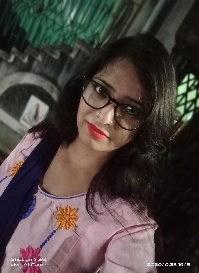
I am Susmita Saha, an ex-student of Ramakrishna Sarada Mission Vivekananda Vidyabhavan from the department of Sanskrit of the session 2011-14. I consider myself very lucky to have spent the most important three years of my life here. This college has provided me an environment that has helped me in enriching myself spiritually, intellectually, and morally as an individual. Different type of activities and vivid field-oriented competitions arranged by the college have also helped me increasing my confidence and abilities as an individual. Rules and regulations, environment of this college have helped us in concentrating on our studies with prior focus. All teachers of this college are very affectionate, helpful and they are highly qualified, very efficient as well as proficient in their teaching method. The journey from my first day of my college till the day I passed out was really a wonderful learning experience of my life as a student with a bank of enriched knowledge. This college has helped us to realise the real essence of Sanskrit as a subject in academic field and its application in shaping character of an individual. All lectures provided by our faculty were very informative, relevant as well as illustrative. They are our real mentors. They helped us in learning to solve any sort of problem. The financial support given by the college helped me in continuing my studies smoothly without any constraint. The Department faculty arranged all sorts of books, necessary study materials required for my studies. Along with academic activities, other co-curricular activities arranged by our department like Sanskrit Day observation, Magazine publishing (‘चरैवेति’’) also helped me in growing as an individual and have increased my confidence for future phase of my life. This journey of three years as a student has gifted me a different individual as a learner, as an educator and most importantly as a human being. Now I am a State Aided College Teacher at Sree Chaitanya Mahavidyalaya. This college has strengthened my footstep for next phase of my life as an educator. Now, whenever I teach my students, I always try to follow my college teachers, their values, their ethics, and their teachings.
ANINDITA CHAKRABORTY
Batch 2015-18
TCS, Process Associate (since November 2018)

I am extremely fortunate to have studied at RKSMVV, the college of Swami Vivekananda’s dreams. College life was an altogether different experience. The education, culture and tradition of this college stand out from that of others. The subject of my graduation, Sanskrit, is not related to my occupation but it guides me indirectly. The eternal life-values as learnt from this college will nourish me life-long.
The faculty of the department of Sanskrit is very helpful. We never had any doubts about the completion of our syllabus ever. The teachers also discussed many supplementary topics to augment our scope. We could approach them with almost every issue. The teachers of other departments were also equally encouraging. We used to attend seminars of other departments to enlarge our exposure. My experiences in the department, college and hostel are unique because they are all rooted in Thakur, Ma and Swamiji. Glory unto them…
| Dr. Suchismita Khanra (Joardar) Assistant Professor, Department of Sanskrit Victoria Institution (College) Kolkata | |
 |
I am proud to be an alumnus of Ramakrishna Sarada Mission Vivekananda Vidyabhavan. It is not merely an academic institution, but a temple of learning for me. I found profound bliss in the lush greenery of the college campus as well as in the serenity and the politics-free environment. The disciplined college life, the well-stocked library and above all the student-teacher bonding offered an excellent academic atmosphere. Not only the syllabus-oriented lessons, but also the daily Morning Prayer, the cultural activities throughout the year and the moral lessons enriched me a lot and helped me greatly to become a better version of myself. I can hardly forget the individual attention, immense support and continuous inspiration that I had received from my teachers. I express my sincere gratitude to my teachers, because of whom I have become what I am today. I feel, indeed, lucky enough to be a member of the Vidyabhavan-family and I shall cherish the sweet memories of the golden years of my precious college-life forever. |